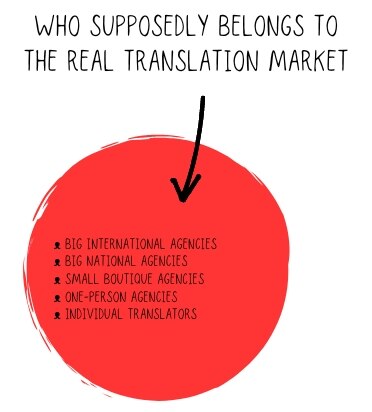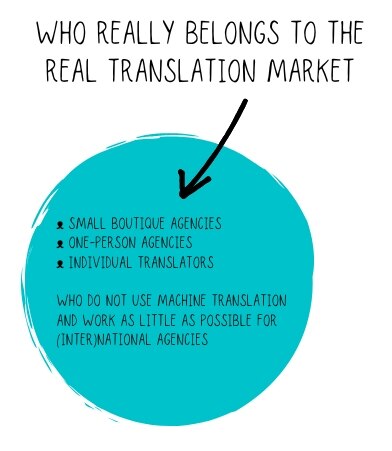The real translation market: smaller than you may think
In general, the translation market is believed to consist of the following service providers:
ᴥ big international translation agencies
ᴥ big national translation agencies
ᴥ small boutique translation agencies
ᴥ one-person translation agencies (who outsource)
ᴥ individual translators

This may be a generalisation, but big (inter)national translation agencies definitely do not form part of the real translation market:

They are no translation agencies in the strict sense of the word, but money-generating companies. Their whole business model is based on one single objective: to get the highest possible turnover.
The strategy is simple: they count on the fact that the client cannot judge the quality of the text (e.g. because he does not know the language) or that the text is just about good enough to be more or less acceptable. To this end, they use the cheapest possible translators, so that they can maximise their margin.
In pursuit of even more turnover and profit, they happily turn to a tool that is not so new: machine translation. It gets them the same quality (or lack thereof) as before, but now with an even larger margin. Why do they turn to machine translation? For no reason other than money! Quality is the last thing on their minds.
The three other categories – small boutique agencies, one-person agencies and individual translators – operate in the real translation market, providing they don’t involve themselves with machine translation (use it or proofread it), don’t try to copy the forementioned providers, and work for them as little as possible.
Bakers
You can compare the big (inter)national translation agencies with industrial bakers: they turn out a massive amount of loaves, but their bread only contain some water (MT) and flour (the cheap translators), but has virtually no taste.
The real quality people in the real translation market are like the artisan bakeries that produce that delicious, tasty bread that makes your mouth water.
Decision
Most translators end up in one or another category by accident, and therefore find themselves either in or out of the real translation market. I would like to ask every translator to make an informed, mature decision on whether you want to belong to the real translation market. You can make that decision more than once in your career (for example, based on a clearer insight).
This decision determines literally EVERYTHING in your career: your tools, your method of working, your organization, your self-worth, your professionalism (or lack of it), your mindset, and finally also your turnover.
This decision is based on the following factors:
ᴥ Your own quality, how well you translate:
If you are very good at what you do and have excellent writing skills, clients are prepared to pay for them and you don’t need to sacrifice those skills to machine translation. Machine translation will never turn you into a high-quality translator.
I can already hear the excuses: but I use it for inspiration only, but I change a lot, but…
If you want inspiration for a difficult text, get in touch with a fellow translator. You’ll even have some social contact while you’re at it.
And if you change a lot, then why bother using it in the first place?
No, a professional translator who wants to belong to the real translation market, does not use any machine translation. I have tested DeepL myself,
and after every translation I had the unpleasant feeling that it was not my
translation, not even when I seriously changed the translation provided. On top
of that, machine translation makes no
end of mistakes.
ᴥ How much effort you are prepared to put in:
○ Investing in tools
○ Investing in personal development
○ Investing in social media
○ Investing in networking
○ Investing in other things that advance your business
Again there are many excuses, most of the time ‘no money’ and ‘no time’.
No money is no a relevant excuse. Mainly in the western world, there is an excess of money. In all other service industries, borrowing money to build your business is normal. Why should this be different for translators? If you really believe in yourself, it should not be a problem, should it?
And if the bank is not forthcoming, there may be family members, friends or other entrepreneurs who may be willing to lend you some money or invest in you. However, you will need to make some effort and believe in yourself.
No time is an even more pathetic excuse. If you don’t spend time on yourself and your business, why would you expect anyone else to bother? You invest time to earn more later, so you need to work less… and again have more time to further develop your business.
These ridiculous excuses are only used by those who do not want to be a part of the real translation market.,
Different types of translators
This is no criticism against people who consciously choose to work for translation agencies, with or without machine translation and post-editing, and who are prepared to accept the
consequences (be part of the money-making racket, earn a lot less, etc.).
Everybody is free to make their own choice. There is no bad or good choice, only your choice.
Part of the translators, however, are green with envy of the few translators who are active in the real translation market and earn good money thanks to the efforts they made and continue to make. They are people with limiting beliefs whom you can find in various translator groups on the social media, and who constantly whine.
If you make the decision to be part of the real translation market, you do need patience. Even if you put in extraordinary effort and provide real quality, it can easily take you up to two years to enjoy real success.
What is your decision?
And if you have a business that needs translations, what market do you want to turn to for your translations?
Epilogue: advice for the translator
Some advice for people deciding whether to join the real translation market: take a mentor or business coach (or both) to help you grow, because you cannot do this alone. Smart and successful entrepreneurs are entrepreneurs who surround themselves with other very professional people they rely on.
Epilogue: advice for the entrepreneur
If you are an entrepreneur who realises that the quality of your translations has a direct impact on your image and reputation and therefore your turnover and profit, then you already know that the real translation market is the only one to turn to.
